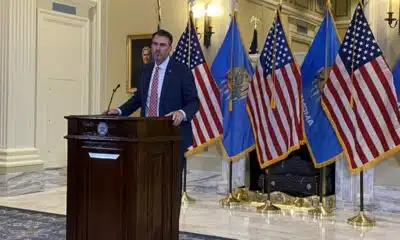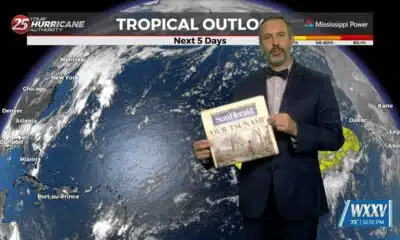News from the South - Florida News Feed
Scattered morning showers across South Florida, triple digit “feels like” temps in the afternoon
SUMMARY: Scattered morning showers and storms are affecting South Florida, especially near Fort Lauderdale, Pompano Beach, and Miami, with rain chances peaking around midday before decreasing in the afternoon. Temperatures are warm, reaching highs near 90°F, but with humidity, “feels like” temperatures will climb into the triple digits—over 100°F in areas like Coral Springs and Big Pine Key. Breezy conditions off the ocean are bringing moisture inland. The weekend will be hotter and drier with increasing humidity, raising concerns about dangerous heat indices and potential heat advisories. Meanwhile, a Gulf Coast low-pressure system has a 30% chance of tropical development, bringing heavy rain and flooding risks there.
NEXT Weather meteorologist Lissette Gonzalez says scattered showers and storms will push inland toward the west in the afternoon.
For video licensing inquiries, contact: licensing@veritone.com
News from the South - Florida News Feed
Delray Beach leaders fight for rainbow street mural during Florida hearing in Orange County
SUMMARY: Delray Beach city leaders traveled nearly 200 miles to a Florida Department of Transportation (FDOT) hearing regarding the state’s request to remove a rainbow pride mural at Northeast Second Avenue and First Street. The mural commemorates the Pulse nightclub shooting anniversary and was painted in 2021. No final decision was made; the city must submit supporting documents by September 5. City attorney Howard DuBosar argued the mural is street art, not a traffic control device, and cited local control under “Home Rule.” FDOT emphasized safety and state standards. Governor DeSantis supports removal of such messages from crosswalks. The mural remains for now pending the decision.
The post Delray Beach leaders fight for rainbow street mural during Florida hearing in Orange County appeared first on www.clickorlando.com
News from the South - Florida News Feed
Rudy Giuliani leaves the hospital after being injured in a car crash in New Hampshire
SUMMARY: Rudy Giuliani, 81, was released from the hospital after a car accident in New Hampshire where the vehicle he was in was struck from behind on Interstate 93. Giuliani sustained a fractured thoracic vertebra, multiple lacerations, contusions, and injuries to his left arm and leg. He and the driver, spokesman Ted Goodman, were helping a woman who reported a domestic violence incident when the crash occurred. Both suffered non-life-threatening injuries. The crash’s cause is under investigation, with no charges filed. Giuliani, known as “America’s mayor” for his 9/11 leadership, later served as Trump’s personal attorney, involved in controversial election fraud claims.
The post Rudy Giuliani leaves the hospital after being injured in a car crash in New Hampshire appeared first on www.news4jax.com
News from the South - Florida News Feed
Pinellas GOP House member’s town hall gets raucous
by Mitch Perry, Florida Phoenix
September 2, 2025
It’s not just Republicans in Congress who are being aggressively challenged at town-hall meetings this summer.
Pinellas County state Rep. Berny Jacques heard loudly from some critics about the way Florida Republicans are running the state while hosting a town hall meeting at the Abundant Life Ministries in Largo Friday night.
While touting DOGE efforts led by Florida Chief Financial Officer Blaise Ingoglia to review spending by local governments, Jacques was interrupted by a man who began shouting about “home rule.”
“You’re talking about giving over our finances and giving up control to the state government and having their Big Brother eyes scrutinizing these cities, whether it’s big cities or small cities. Like, what about the city’s own ability to judge for themselves? ” the man yelled at Jacques. “You’re taking away everybody’s power to hold their own electeds responsible if they so choose.”
“I would push back against your dismissiveness of the state’s role in all of this,” Jacques responded. “And I believe in home rule as much as the next guy, but when government is intentionally or blatantly wasting your money, and people don’t have recourse —”
The man angrily retorted: “Wasting your money? $300 million on Alligator Alcatraz!” He referred to the costs of the immigrant detention facility built by the state in the Everglades. (Court filings in a federal lawsuit brought by environmental groups and the Miccosukee Tribe of Florida say that the state has spent at least $218 million in constructing the facility).
“There should be no resistance to being transparent,” Jacques responded, his voice rising. “Anybody who is resistant to be transparent has something to hide, and they need to be brought to heel!” Other members of the crowd cheered him on.
“Like the Hope [Florida] Foundation, right?” Another voice in the audience immediately called out.
Another inquiry about the costs of constructing the Everglades deportation facility prompted Jacques to say that the state and the country gave President Trump the green light to enact his promise of mass deportations of immigrants without legal papers when they reelected him to the White House last year.
“He has to deliver on that mandate,” he said. “Anything less would be a disappointment, and I’m so glad that the president is amping it up, and I’m so glad that our state government is being a strong partner in amping up the deportations because it’s what the people demanded.”
Congressional redistricting
The next issue was congressional redistricting. Gov. Ron DeSantis has said it’s likely the Legislature will follow Texas in redrawing the state’s congressional districts map before the 2026 election.
The woman asking the question prefaced it by denouncing the 2022 congressional map drawn up by DeSantis that eliminated a majority-Black district in North Florida (that was recently upheld by the Florida Supreme Court).
She also criticized the 2022 state Senate-approved map that a federal judicial panel upheld within the past month. She went on to describe the call by Trump for Republican lawmakers to redraw their congressional lines was a way to “silence the voices of millions of Floridians.”
“Do you intend to support this obvious gerrymandered and partisan redistricting?” she asked Jacques.
“I will support our redistricting if they get the numbers accurately,” he replied, adding that he believes Florida was undercounted in the 2020 U.S. Census and robbed of one or two congressional seats. “So, there should be a new Census,” he said. “There should be a citizenship question. We should know who’s here, and we should redistrict accordingly in a way that’s accurate with the current times.”
A few minutes later a woman stood up and chastised Jacques and the crowd for displaying what she called un-Christian behavior. She then criticized law enforcement officers arresting and detaining people who they claim lack the legal right to be here without due process.
“You have to prove that. Instead of allowing funds to be diverted to federal initiatives, we are investing in concentration camps in the United States,” she said. “Now, the Germans said the Jews were criminals and they were taking away from our —”
An uproar from the crowd ensued, drowning out the remainder of her sentence.
“Before we go to the next person, just to be clear, I disagree with everything she just said,” Jacques responded, as an official with the church intervened to try to keep the peace. At that point, the man who who initially shouted out to Jacques yelled back at the church official. Members of the crowd yelled, “We don’t want to hear you,” and he peaceably left the event.
The crowd settled down after that.
The Pinellas Republican was later asked about SB 180, the measure sponsored by fellow GOP Republican Sen. Nick DiCeglie designed to expedite post-disaster rebuilding. There’s been a substantial backlash from local government officials since it went into effect. They object to a provision that prevents local governments from passing any new local land-use or development regulations that could be considered “more restrictive or burdensome” than what was already on the books.
“We vote on hundreds of bills. And every now and then, probably more times than we care to admit, we have some unintended consequences. And then you have to go back and adjust,” Jacques responded. “That is an issue I’m looking into, because I’ve been hearing from several people who are involved in local government and we don’t want to be overdeveloped.”
Property taxes
Another inquiry from a woman who identified herself as a member of the Pinellas Republican Liberty Caucus was about the (still to be written) constitutional amendment expected to be on the ballot next year aimed at either eliminating or reducing property taxes on homesteads. If approved, she asked, would that mean that the tax burdens would simply just shift into higher sales taxes, more tolls, or higher fees at state parks?
“It will depend on the particular city,” Jacques said. “Even if all homestead property taxes went away, they could still make it up on second homes, they could still make it up on commercial properties.”
He added that the idea that local governments could lose some of their funding via property taxes “forces them to look inward. And then to start making priorities and to get back to basics of police, fire, roads, sewage systems.”
After the meeting, Jacques said he wasn’t taken aback by the aggressive questioning by some members of the audience.
“I’m always prepared to engage with both passionate supporters and those who are not supporters, so I was not surprised,” he told the Phoenix in a text message. “This was our third annual town hall since elected. I welcome the constituent engagement — I work for all of them.”
YOU MAKE OUR WORK POSSIBLE.
Florida Phoenix is part of States Newsroom, a nonprofit news network supported by grants and a coalition of donors as a 501c(3) public charity. Florida Phoenix maintains editorial independence. Contact Editor Michael Moline for questions: info@floridaphoenix.com.
The post Pinellas GOP House member’s town hall gets raucous appeared first on floridaphoenix.com
Note: The following A.I. based commentary is not part of the original article, reproduced above, but is offered in the hopes that it will promote greater media literacy and critical thinking, by making any potential bias more visible to the reader –Staff Editor.
Political Bias Rating: Center-Right
The content primarily presents the perspective of a Republican state representative defending conservative policies such as increased state oversight, support for immigration enforcement, and backing redistricting efforts favored by Republicans. While it includes critical voices from constituents expressing concerns about government overreach, gerrymandering, and social justice issues, the overall framing and responses lean toward a center-right viewpoint aligned with Florida GOP positions. The article maintains a relatively balanced tone by reporting both the criticisms and the representative’s rebuttals without overt editorializing.
-
Mississippi Today3 days ago
DEI, campus culture wars spark early battle between likely GOP rivals for governor in Mississippi
-
Mississippi Today7 days ago
Judge: Felony disenfranchisement a factor in ruling on Mississippi Supreme Court districts
-
News from the South - North Carolina News Feed5 days ago
Parasocial party: Why people are excited for the Taylor Swift, Travis Kelce engagement
-
News from the South - Louisiana News Feed6 days ago
K+20: Katrina alters local health care landscape, though underlying ills still the same
-
Our Mississippi Home6 days ago
The Great Backyard Recovery – Helping Birds After the Storm
-
The Center Square6 days ago
U-M Health ends transgender treatment for minors | Michigan
-
Local News Video4 days ago
08/29 Ryan's “Wet End to the Week” Friday Forecast
-
News from the South - Florida News Feed6 days ago
Man who shot ex-girlfriend died after shootout with deputies at apartment complex, MDSO says










































